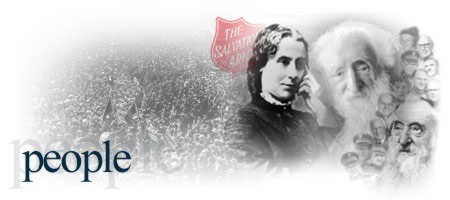| Founders of the Salvation Army. |
 |
|
|
William Booth was
born an Anglican and became a Methodist
preacher. Catherine Mumford, who married William Booth in 1855, had roots
in Methodism, and was deeply influenced by Charles
Finney and the American holiness
leader Phoebe Palmer. The Booths left Methodism to pursue an independent
ministry. Catherine Booth was a successful preacher in her own right;
her insistence on full equality for women, based on her understanding
of the Scripture, marks her as a pioneer of the women's
movement. The Booths led the East London Christian Mission, which
sought to reach the working poor of London with the gospel and practical
help such as food, shelter, and education for employment. By 1878, the
movement had developed into the Salvation Army, and its aim was to reach
poor people in slums, bars, jails, brothels, and factories. The use of
military ranks and uniforms, female as well as male preachers, street
marches and band music made for critics as well as converts. Every convert
was expected to be an evangelist. Many people opposed and ridiculed the
movement, sometimes attacking its preachers and workers. The Salvation
Army spread to the United States, Australia,
Canada, India, and other countries, offering revivalism and social services.
|